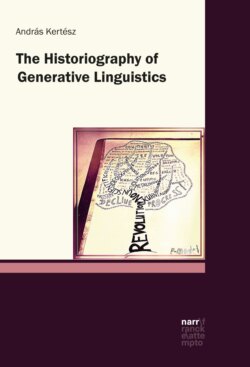Читать книгу The Historiography of Generative Linguistics - András Kertész - Страница 30
На сайте Литреса книга снята с продажи.
2.4.1.2 KuhnianKuhnian revolutionrevolutionKuhnian without paradigmparadigm replacement
ОглавлениеKornmesserKornmesser, Stephan’s (2014a), (2014b) approach is unique in that although the author makes use of the KuhnianKuhnian terms ›scientificscientific revolutionrevolutionscientific‹ and ›paradigmparadigm‹, he does not claim that the Theory of Principles and ParametersPrinciples and Parameters, Theory of is revolutionaryrevolutionary relative to previous stages of generative linguistics or the neo-Bloomfieldianneo-BloomfieldianBloomfieldian school; rather, he argues that it is revolutionary with respect to another trend which coexists with it, namely, Construction GrammarConstruction Grammar.1
KornmesserKornmesser, Stephan’s line of argumentation starts with the reconstruction of the standard interpretation of KuhnKuhn, Thomas S.’s view of the relationship between scientificscientific revolutionrevolutionscientific and paradigmparadigm change. The standard interpretation says that »[i]f a scientific revolution takes place between an old paradigm P1 and a new paradigm P2, then P1 is replaced by P2.« (Kornmesser 2014a: 91). As opposed to this, by analyzing Kuhn’s work, Kornmesser argues that there are scientific revolutions in the KuhnianKuhnian sense without paradigm change. In order to avoid that his claim, according to which there are scientific revolutions without paradigm replacement, turns out to be false or requires a different understanding of the term ›scientific revolution‹ from Kuhn’s, he tries to show that, contrary to common belief, Kuhn’s original idea of scientific revolution does not entail paradigm replacement.
Following this, the author reconstructs the Theory of Principles and ParametersPrinciples and Parameters, Theory of and Construction GrammarConstruction Grammar according to a set of criteria. These criteria are yielded by the author’s interpretation of the components of KuhnKuhn, Thomas S.’s term ›disciplinary matrixdisciplinary matrix‹ (KornmesserKornmesser, Stephan 2014b).2 He concludes that since both approaches conform to these criteria, they are to be regarded as paradigmsparadigm in Kuhn’s sense, although they coexist: »the relation of both paradigms is that of a scientificscientific revolutionrevolutionscientific without one paradigm being replaced by the other one« (Kornmesser 2014a: 91). Accordingly, his central historiographicalhistoriography thesis is (T17):
| (T17) | (a) | The relation of the Theory of Principles and ParametersPrinciples and Parameters, Theory of to Construction Grammargrammar is that of a KuhnianKuhnian scientificscientific revolution.evolutionevolutionscientific |
| (b) | There is no paradigmparadigm replacement between them; rather, they are coexisting rival paradigms. |
Since KuhnKuhn, Thomas S. claims that only those disciplines have reached maturity in which there has been at least one paradigmparadigm, linguistics is no longer an immatureimmature, but a maturemature discipline (KornmesserKornmesser, Stephan 2014b).
Finally, he asks the question of whether the competition between these two paradigmsparadigm is constructive or destructive. Destructive competition between paradigms is assumed to be governed by ideologicalideology debates similar to conflicts between proponents of different religions. KornmesserKornmesser, Stephan’s (2014b) answer to this question says that, first, the competition of the two paradigms is not of an ideological nature and it is therefore, in the sense mentioned, not destructive. Second, their comparison is very restricted because they are incommensurableincommensurable and methodologically complementary. Consequently, it seems to be the case that neither of the two paradigms is capable of replacing the other.
With respect to our main problem (P), KornmesserKornmesser, Stephan’s train of thought boils down to (SP17):
| (SP17) | The basic term of the historiographyhistoriography of generative linguistics is ›scientificscientific revolutionrevolutionscientific without paradigmparadigm replacement‹ with respect to the relation between the Theory of Government and BindingGovernment and Binding, Theory of (Principles and Parameters) and Construction Grammar,Construction Grammar its central hypothesis is (T16) and its framework is KuhnKuhn, Thomas S. (1970) [1962]. |
